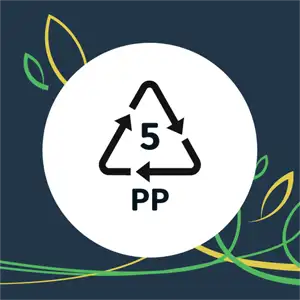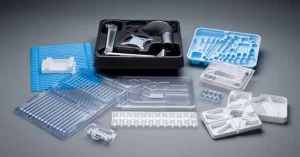Polipropileno - Nombre real del plástico PP

Polypropylene, abbreviated as PP plastic, is a versatile thermoplastic polymer commonly used in plastic injection molding. It is very popular in many areas of industry. It can be made into fibers or produced in the form of films or sheets for packaging, medical devices, and more. Polypropylene's various unique properties make it the second most widely produced plastic after polyethylene.
First, Polypropylene is used in a wide range of applications
Polypropylene is available in several different grades and can be produced in a variety of ways. For example, it can be made transparent or opaque, woven into fibers or molded by plastic injection. It can be formed into solid shapes, hard tubes and flexible sheets and films. It is also easily recyclable. This is because the polymer chains it contains do not degrade when they are melted for plastic injection molding. Instead, they retain their integrity, so polypropylene can be remelted, reshaped and cooled for reuse. This makes polypropylene very versatile and more environmentally friendly than other types of plastic polymers.

What Properties do polypropylene has?
Polypropylene is often selected for use in plastic injection molding manufacturing projects because of its many useful properties. For example, it is fatigue resistant, which is important for applications that rely on a hinge mechanism, such as bottle caps or lids attached to plastic boxes. It is also resistant to chemical leaching and corrosion. This makes the material ideal for medical and construction applications. More fundamental properties of polypropylene include resilience to most forms of physical damage, including impact and freezing.
PP Plastic once to be called Medical Miracle Material
Polypropylene has extremely high hygienic protection and heat resistance, allowing it to be used in a variety of medical and scientific applications. Common examples include synthetic sutures and medical nets. Polypropylene is also an important component of the raw materials used to make medical grade masks. Polypropylene is also used in the manufacture of medical diagnostic equipment, scientific equipment, and even chairs that patients sit in while waiting to be seen. During the COVID-19 pandemic, there was a massive increase in demand for this material worldwide.
You won't believe untile I told you, the Polypropylene may not immediately come to mind when considering which textiles are the most fashionable, but it is still a common component of clothing and accessories. It can be made into fibers that are then woven into shopping bags and straps for clothing. It is sometimes used in base layer garments because of its insulating properties and its ability to wick sweat away from the skin.
In addition to the examples of polypropylene use described above, polypropylene can be used in much smaller areas. For example, it is used as a foam for radio-controlled model airplanes, where its lighter weight and higher density make it an essential ingredient. Polypropylene ropes are also used in the fishing industry because they typically last longer than other natural materials and can withstand repeated wetting and drying cycles better.
Polypropylene's resistance to staining also makes it a good choice for children's toys and items that are often handled. The colored square stickers on Rubik's Cubes are made of polypropylene to keep them clean and easy to move. Finally, polypropylene makes the paper money in opaque ink that requires clear slits for security checks.

